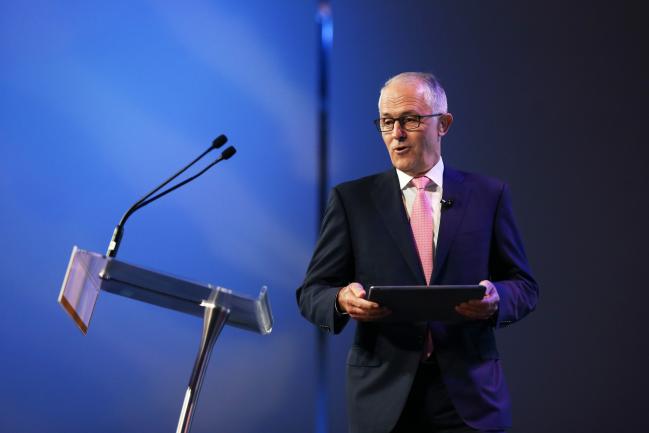(Bloomberg) -- Australia’s leader Malcolm Turnbull will use Tuesday’s budget to try and woo back disaffected voters before Donald Trump and Xi Jinping’s trade tensions undermine the most China-dependent developed economy.
A sudden surge in revenue is allowing Turnbull to offer tax relief instead of paying down the country’s budget deficit as early as possible. He’s gambling that workers saddled with record household debt and stagnant wage growth will vote with their wallets in an Australian general election that’s due within a year.
There’s two big risks to his strategy. Reserve Bank Governor Philip Lowe last week said while Australia’s economy was in generally good shape, it had “a lot resting” on U.S. protectionism risks and China’s handling of its massive debt pile. While a windfall from company profits and commodity prices will be the biggest since the global financial crisis, an external shock could easily imperil Turnbull’s promised return to surplus by 2021.
“He suddenly has more options at an important time -- ahead of an election,” said Martin Drum, a senior political lecturer at Notre Dame University in Perth. “Tax cuts may be welcomed by many, but the hard reality is we’re still running deficits and the bounce in revenue may not be sustained, so Turnbull needs to be careful of not being too generous and giving too many handouts.”
Turnbull’s Liberal-National coalition has long promoted itself as a paragon of fiscal management, staking its economic credentials on returning to surplus and keeping the nation’s cherished AAA rating. While the Labor opposition has flagged it may support some income tax cuts, it’s vowed to curb property tax breaks and opposes cuts to corporate levies that Turnbull wants.
Since winning power less than three years ago, Turnbull has been plagued by poor opinion polls, scandals involving senior lawmakers, and undermining from within his own government. Most recently, his deputy was forced to resign after impregnating a staff member he was having an extramarital affair with.
The prime minister has finally caught a break. Strong employment growth has driven up profit taxes while higher prices for Australian iron ore, coal and other commodities have boosted revenue receipts. Tax receipts up to March were A$5.3 billion ($4 billion) higher than estimated in December.
Treasurer Scott Morrison will on Tuesday announce new rules to ensure total taxes will never exceed 23.9 percent of gross domestic product, the Australian newspaper reported Monday, without citing sources. He’ll also say the budget is expected to return to balance in fiscal 2020, a year ahead of schedule, and infrastructure spending will increase by A$24.5 billion, it said.
The global and Australian economies are “doing the budget plenty of favors,” Deloitte Economics said in a note previewing the budget. Still, it warned of the danger of the government “promising too much, too soon off the back of uncertain economic outcomes.”
While the U.S. and China have been in negotiations over their trading relationship following tit-for-tat threats of tariffs initiated by Trump, the U.S. has tempered expectations of a breakthrough. China buys 35 percent of Australian exports, and the deterioration of a global open trading system would be a serious threat to Australia’s economy.
Voters may be feeling jittery. A JWS poll published in the Australian Financial Review last week showed more believed that reducing government debt is a priority over receiving tax cuts.
For now, Turnbull is betting the revenue surge will allow him to deliver both. That could put his government, which has consistently trailed in opinion polls to the main Labor opposition, back in a winning position.
“The government is enjoying some rare fresh air,” said Notre Dame University’s Drum. “Turnbull will feel that he’s in with a decent chance of winning the election.”
(Updates with expected budget measures in eighth paragraph.)
